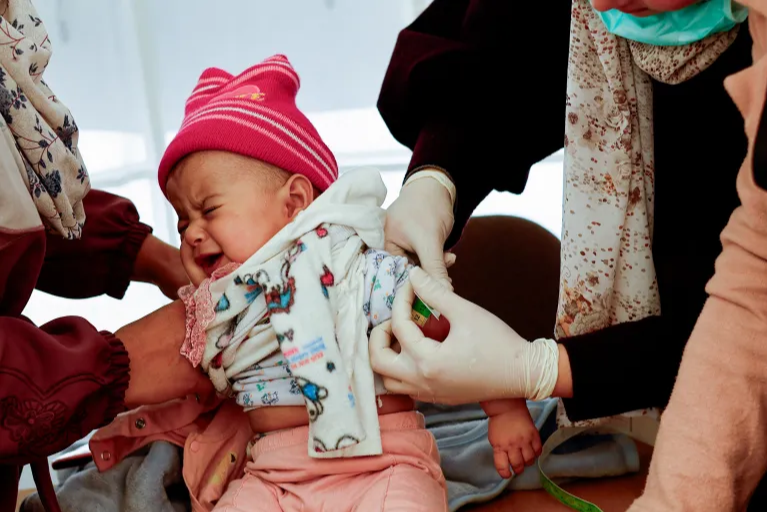
A Palestinian girl has her arm measured for malnutrition at a medical tent in Rafah in the southern Gaza Strip [File: Ibraheem Abu Mustafa/Reuters]
Geneva, August 8 (RHC)- The World Health Organization (WHO) says it is working on a campaign against polio in Gaza after the virus was detected there, but the continuing war presents multiple hurdles to the effort. While no clinical cases have been diagnosed so far, polio was detected in sewage in Gaza’s Deir el-Balah and Khan Younis areas, WHO polio specialist Hamid Jafari said in a news conference on Wednesday.
“We need a ceasefire, even a temporary ceasefire to successfully undertake these campaigns. Otherwise, we risk the virus spreading further, including across borders,” said Hanan Balkhy, regional WHO director.
On July 30th, the Health Ministry in Gaza declared the Palestinian territory to be a “polio epidemic zone”, blaming the reappearance of the virus on Israel’s 10-month military offensive and the resulting destruction of health facilities. The ministry said the CPV2 strain of the virus was detected in wastewater samples taken in the Khan Younis region in the south of the Strip, as well as in areas of central Gaza.
Children under five are most at risk from the viral disease, especially infants under two, since normal vaccination campaigns have been disrupted by the conflict.
Also on Wednesday, WHO Director-General Tedros Adhanom Ghebreyesus said they will send more than one million polio vaccines to Gaza, AFP news agency reported. Ghebreyesus said health workers need freedom of movement in Gaza to administer the vaccines, saying a ceasefire or at least a few days of calm was essential to protect Gaza’s children. “WHO is sending more than one million polio vaccines which will be administered in the coming weeks,” he said.
Humanitarian advocates have stressed the need to end the violence to address the health crisis in Gaza.
Balkhy also pointed out the risk of the development of antimicrobial resistance within Gaza, and the possibility of such strains spreading into other countries.
Poliomyelitis, which is spread mainly through the fecal-oral route, is a highly infectious virus that can invade the nervous system and cause paralysis. Cases of polio have declined by 99 percent worldwide since 1988, thanks to mass vaccination campaigns and efforts continue to eradicate it completely.
Israel has restricted humanitarian groups’ access to Gaza, and Israeli forces have bombed aid convoys, killing dozens of aid workers. Moreover, the Israeli offensive has put most of Gaza’s hospitals out of commission. And the repeated displacement of Palestinians, who continue to face evacuation orders by the Israeli military, makes it difficult to locate and reach unvaccinated children.
There have been growing concerns about the spread of diseases in Gaza due to the humanitarian crisis, lack of medical supplies and destruction of water sanitation plants by Israel.
Gaza had recorded 24 times the normal rate of diarrhoea cases, as well as more than 100,000 cases of scabies and lice, and 70,000 cases of skin rashes as a result of overcrowding, overflowing sewage and contaminated water, said Richard Peeperkorn, WHO representative in the occupied Palestinian territory.

